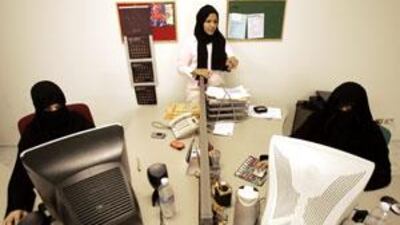Beirut // As the Arab Web industry found its voice at its first gathering last week, there was talk of an entrepreneurial boom in Jordan, Dubai's digital advertising industry and the emergence of Cairo as an online centre. But ask a Web business, or more importantly, an online advertiser, where they want to see their digital properties growing, and the answer is almost unanimous: Saudi Arabia.
The kingdom, home to about one in seven Arab internet users and a fifth of Arab GDP, is emerging as a make-or-break market for those looking to build serious businesses on the Arab Web. "It is hard to talk about being a top level competitor on the Web in our region and not be seriously committed to Saudi Arabia," said Rashid al Ballaa, who manages National Net Ventures (N2V), the country's largest internet business.
"It is the place you have to be when you look at the entire market." Many Web professionals say Saudi Arabia was central to the success story of Jordan's Maktoob Web portal, which was sold to Yahoo for US$164 million (Dh602.3m) last year. The valuation came largely thanks to a strategy of buying popular Saudi discussion forums, which significantly boosted the company's user base and appeal to advertisers.
A similar approach is being taken by D1G, another Jordanian portal, which has acquired a number of Saudi sites. D1G attracts about 3 million unique users each month, more than half of them from the kingdom, said Fouad Jeryes, who is the company's resident entrepreneur, responsible for developing new businesses. "The size of the market means it can't be ignored and it has some very lucrative characteristics for a Web company," he said. "You've got a big population, they are young, they are comfortable with credit cards and they have strong spending power. And they are hungry for great content."
But while Dubai, Amman and Beirut, whose broader economies are supported by Saudi Arabia's immense purchasing power, have become viable hubs for the online industry, the Saudi Web sector has remained largely independent of the rest of the region. "We are here, we are doing great things, but we have never been as good at the PR, at the marketing, at talking about what we are doing," said Essam al Zamel, the manager of Remal IT, a Web company based in Saudi Arabia.
Jihad Alammar, a Saudi entrepreneur who demonstrated his new Web company last year, said: "I look at things as an engineer. I like to think that my product speaks for itself." Qaym, Mr Alammar's new business, is an online business directory, powered by user-generated reviews and feedback. The site aims to do for the Arab market what sites such as Yelp, which Google tried to acquire last year for more than $500m, have achieved in the US.
"I have no doubt that Saudi Arabia will become the next technology hub for the Arab world," said Fouad Masoud, a Dubai-based entrepreneur who presented Wasfati, an Arabic-language cooking and recipe site to the conference last week. Sites such as his target mothers, a valuable advertising demographic, and are seen as particularly promising in the kingdom. "We can't just be Saudi focused, we need to be Middle East focused," he said. "But succeeding there is very, very important."
tgara@thenational.ae

